Yuhang Jiang
Small Generalizable Prompt Predictive Models Can Steer Efficient RL Post-Training of Large Reasoning Models
Feb 02, 2026Abstract:Reinforcement learning enhances the reasoning capabilities of large language models but often involves high computational costs due to rollout-intensive optimization. Online prompt selection presents a plausible solution by prioritizing informative prompts to improve training efficiency. However, current methods either depend on costly, exact evaluations or construct prompt-specific predictive models lacking generalization across prompts. This study introduces Generalizable Predictive Prompt Selection (GPS), which performs Bayesian inference towards prompt difficulty using a lightweight generative model trained on the shared optimization history. Intermediate-difficulty prioritization and history-anchored diversity are incorporated into the batch acquisition principle to select informative prompt batches. The small predictive model also generalizes at test-time for efficient computational allocation. Experiments across varied reasoning benchmarks indicate GPS's substantial improvements in training efficiency, final performance, and test-time efficiency over superior baseline methods.
Unsupervised Data Generation for Offline Reinforcement Learning: A Perspective from Model
Jun 24, 2025Abstract:Offline reinforcement learning (RL) recently gains growing interests from RL researchers. However, the performance of offline RL suffers from the out-of-distribution problem, which can be corrected by feedback in online RL. Previous offline RL research focuses on restricting the offline algorithm in in-distribution even in-sample action sampling. In contrast, fewer work pays attention to the influence of the batch data. In this paper, we first build a bridge over the batch data and the performance of offline RL algorithms theoretically, from the perspective of model-based offline RL optimization. We draw a conclusion that, with mild assumptions, the distance between the state-action pair distribution generated by the behavioural policy and the distribution generated by the optimal policy, accounts for the performance gap between the policy learned by model-based offline RL and the optimal policy. Secondly, we reveal that in task-agnostic settings, a series of policies trained by unsupervised RL can minimize the worst-case regret in the performance gap. Inspired by the theoretical conclusions, UDG (Unsupervised Data Generation) is devised to generate data and select proper data for offline training under tasks-agnostic settings. Empirical results demonstrate that UDG can outperform supervised data generation on solving unknown tasks.
A Benchmark for End-to-End Zero-Shot Biomedical Relation Extraction with LLMs: Experiments with OpenAI Models
Apr 05, 2025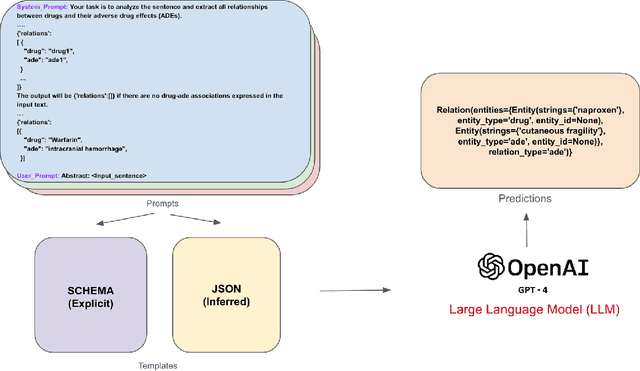
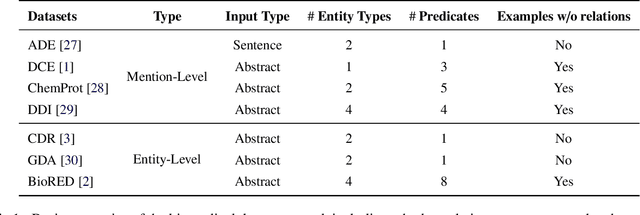
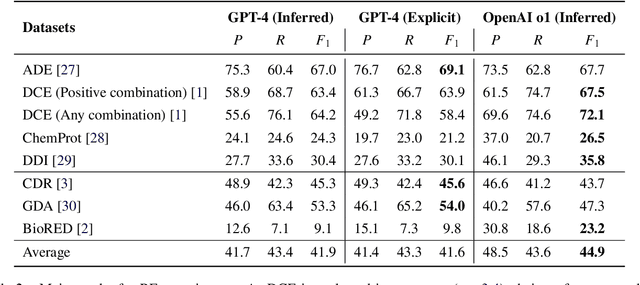
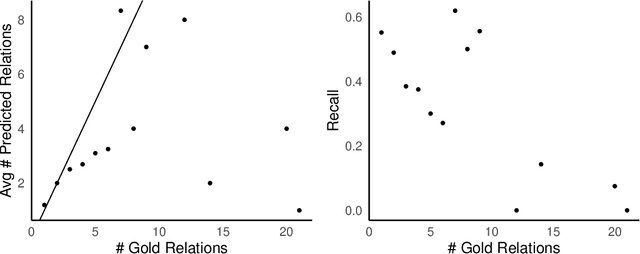
Abstract:Objective: Zero-shot methodology promises to cut down on costs of dataset annotation and domain expertise needed to make use of NLP. Generative large language models trained to align with human goals have achieved high zero-shot performance across a wide variety of tasks. As of yet, it is unclear how well these models perform on biomedical relation extraction (RE). To address this knowledge gap, we explore patterns in the performance of OpenAI LLMs across a diverse sampling of RE tasks. Methods: We use OpenAI GPT-4-turbo and their reasoning model o1 to conduct end-to-end RE experiments on seven datasets. We use the JSON generation capabilities of GPT models to generate structured output in two ways: (1) by defining an explicit schema describing the structure of relations, and (2) using a setting that infers the structure from the prompt language. Results: Our work is the first to study and compare the performance of the GPT-4 and o1 for the end-to-end zero-shot biomedical RE task across a broad array of datasets. We found the zero-shot performances to be proximal to that of fine-tuned methods. The limitations of this approach are that it performs poorly on instances containing many relations and errs on the boundaries of textual mentions. Conclusion: Recent large language models exhibit promising zero-shot capabilities in complex biomedical RE tasks, offering competitive performance with reduced dataset curation and NLP modeling needs at the cost of increased computing, potentially increasing medical community accessibility. Addressing the limitations we identify could further boost reliability. The code, data, and prompts for all our experiments are publicly available: https://github.com/bionlproc/ZeroShotRE
Latent Reward: LLM-Empowered Credit Assignment in Episodic Reinforcement Learning
Dec 15, 2024



Abstract:Reinforcement learning (RL) often encounters delayed and sparse feedback in real-world applications, even with only episodic rewards. Previous approaches have made some progress in reward redistribution for credit assignment but still face challenges, including training difficulties due to redundancy and ambiguous attributions stemming from overlooking the multifaceted nature of mission performance evaluation. Hopefully, Large Language Model (LLM) encompasses fruitful decision-making knowledge and provides a plausible tool for reward redistribution. Even so, deploying LLM in this case is non-trivial due to the misalignment between linguistic knowledge and the symbolic form requirement, together with inherent randomness and hallucinations in inference. To tackle these issues, we introduce LaRe, a novel LLM-empowered symbolic-based decision-making framework, to improve credit assignment. Key to LaRe is the concept of the Latent Reward, which works as a multi-dimensional performance evaluation, enabling more interpretable goal attainment from various perspectives and facilitating more effective reward redistribution. We examine that semantically generated code from LLM can bridge linguistic knowledge and symbolic latent rewards, as it is executable for symbolic objects. Meanwhile, we design latent reward self-verification to increase the stability and reliability of LLM inference. Theoretically, reward-irrelevant redundancy elimination in the latent reward benefits RL performance from more accurate reward estimation. Extensive experimental results witness that LaRe (i) achieves superior temporal credit assignment to SOTA methods, (ii) excels in allocating contributions among multiple agents, and (iii) outperforms policies trained with ground truth rewards for certain tasks.
Can ChatGPT Overcome Behavioral Biases in the Financial Sector? Classify-and-Rethink: Multi-Step Zero-Shot Reasoning in the Gold Investment
Nov 19, 2024



Abstract:Large Language Models (LLMs) have achieved remarkable success recently, displaying exceptional capabilities in creating understandable and organized text. These LLMs have been utilized in diverse fields, such as clinical research, where domain-specific models like Med-Palm have achieved human-level performance. Recently, researchers have employed advanced prompt engineering to enhance the general reasoning ability of LLMs. Despite the remarkable success of zero-shot Chain-of-Thoughts (CoT) in solving general reasoning tasks, the potential of these methods still remains paid limited attention in the financial reasoning task.To address this issue, we explore multiple prompt strategies and incorporated semantic news information to improve LLMs' performance on financial reasoning tasks.To the best of our knowledge, we are the first to explore this important issue by applying ChatGPT to the gold investment.In this work, our aim is to investigate the financial reasoning capabilities of LLMs and their capacity to generate logical and persuasive investment opinions. We will use ChatGPT, one of the most powerful LLMs recently, and prompt engineering to achieve this goal. Our research will focus on understanding the ability of LLMs in sophisticated analysis and reasoning within the context of investment decision-making. Our study finds that ChatGPT with CoT prompt can provide more explainable predictions and overcome behavioral biases, which is crucial in finance-related tasks and can achieve higher investment returns.
Doubly Mild Generalization for Offline Reinforcement Learning
Nov 13, 2024



Abstract:Offline Reinforcement Learning (RL) suffers from the extrapolation error and value overestimation. From a generalization perspective, this issue can be attributed to the over-generalization of value functions or policies towards out-of-distribution (OOD) actions. Significant efforts have been devoted to mitigating such generalization, and recent in-sample learning approaches have further succeeded in entirely eschewing it. Nevertheless, we show that mild generalization beyond the dataset can be trusted and leveraged to improve performance under certain conditions. To appropriately exploit generalization in offline RL, we propose Doubly Mild Generalization (DMG), comprising (i) mild action generalization and (ii) mild generalization propagation. The former refers to selecting actions in a close neighborhood of the dataset to maximize the Q values. Even so, the potential erroneous generalization can still be propagated, accumulated, and exacerbated by bootstrapping. In light of this, the latter concept is introduced to mitigate the generalization propagation without impeding the propagation of RL learning signals. Theoretically, DMG guarantees better performance than the in-sample optimal policy in the oracle generalization scenario. Even under worst-case generalization, DMG can still control value overestimation at a certain level and lower bound the performance. Empirically, DMG achieves state-of-the-art performance across Gym-MuJoCo locomotion tasks and challenging AntMaze tasks. Moreover, benefiting from its flexibility in both generalization aspects, DMG enjoys a seamless transition from offline to online learning and attains strong online fine-tuning performance.
Choices are More Important than Efforts: LLM Enables Efficient Multi-Agent Exploration
Oct 03, 2024

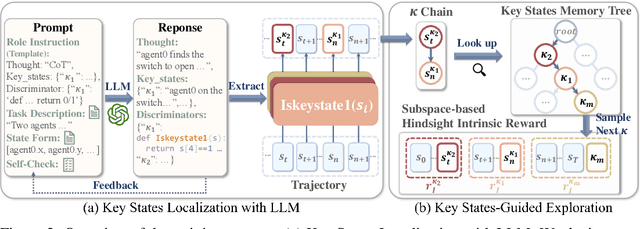

Abstract:With expansive state-action spaces, efficient multi-agent exploration remains a longstanding challenge in reinforcement learning. Although pursuing novelty, diversity, or uncertainty attracts increasing attention, redundant efforts brought by exploration without proper guidance choices poses a practical issue for the community. This paper introduces a systematic approach, termed LEMAE, choosing to channel informative task-relevant guidance from a knowledgeable Large Language Model (LLM) for Efficient Multi-Agent Exploration. Specifically, we ground linguistic knowledge from LLM into symbolic key states, that are critical for task fulfillment, in a discriminative manner at low LLM inference costs. To unleash the power of key states, we design Subspace-based Hindsight Intrinsic Reward (SHIR) to guide agents toward key states by increasing reward density. Additionally, we build the Key State Memory Tree (KSMT) to track transitions between key states in a specific task for organized exploration. Benefiting from diminishing redundant explorations, LEMAE outperforms existing SOTA approaches on the challenging benchmarks (e.g., SMAC and MPE) by a large margin, achieving a 10x acceleration in certain scenarios.
Hokoff: Real Game Dataset from Honor of Kings and its Offline Reinforcement Learning Benchmarks
Aug 20, 2024



Abstract:The advancement of Offline Reinforcement Learning (RL) and Offline Multi-Agent Reinforcement Learning (MARL) critically depends on the availability of high-quality, pre-collected offline datasets that represent real-world complexities and practical applications. However, existing datasets often fall short in their simplicity and lack of realism. To address this gap, we propose Hokoff, a comprehensive set of pre-collected datasets that covers both offline RL and offline MARL, accompanied by a robust framework, to facilitate further research. This data is derived from Honor of Kings, a recognized Multiplayer Online Battle Arena (MOBA) game known for its intricate nature, closely resembling real-life situations. Utilizing this framework, we benchmark a variety of offline RL and offline MARL algorithms. We also introduce a novel baseline algorithm tailored for the inherent hierarchical action space of the game. We reveal the incompetency of current offline RL approaches in handling task complexity, generalization and multi-task learning.
LLM-Empowered State Representation for Reinforcement Learning
Jul 18, 2024
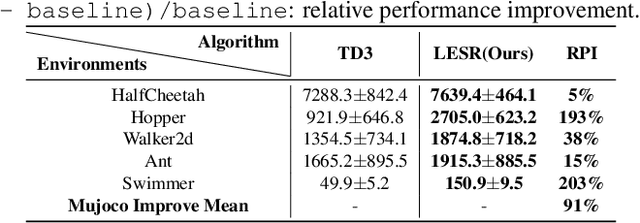


Abstract:Conventional state representations in reinforcement learning often omit critical task-related details, presenting a significant challenge for value networks in establishing accurate mappings from states to task rewards. Traditional methods typically depend on extensive sample learning to enrich state representations with task-specific information, which leads to low sample efficiency and high time costs. Recently, surging knowledgeable large language models (LLM) have provided promising substitutes for prior injection with minimal human intervention. Motivated by this, we propose LLM-Empowered State Representation (LESR), a novel approach that utilizes LLM to autonomously generate task-related state representation codes which help to enhance the continuity of network mappings and facilitate efficient training. Experimental results demonstrate LESR exhibits high sample efficiency and outperforms state-of-the-art baselines by an average of 29% in accumulated reward in Mujoco tasks and 30% in success rates in Gym-Robotics tasks.
End-to-End $n$-ary Relation Extraction for Combination Drug Therapies
Mar 29, 2023



Abstract:Combination drug therapies are treatment regimens that involve two or more drugs, administered more commonly for patients with cancer, HIV, malaria, or tuberculosis. Currently there are over 350K articles in PubMed that use the "combination drug therapy" MeSH heading with at least 10K articles published per year over the past two decades. Extracting combination therapies from scientific literature inherently constitutes an $n$-ary relation extraction problem. Unlike in the general $n$-ary setting where $n$ is fixed (e.g., drug-gene-mutation relations where $n=3$), extracting combination therapies is a special setting where $n \geq 2$ is dynamic, depending on each instance. Recently, Tiktinsky et al. (NAACL 2022) introduced a first of its kind dataset, CombDrugExt, for extracting such therapies from literature. Here, we use a sequence-to-sequence style end-to-end extraction method to achieve an F1-Score of $66.7\%$ on the CombDrugExt test set for positive (or effective) combinations. This is an absolute $\approx 5\%$ F1-score improvement even over the prior best relation classification score with spotted drug entities (hence, not end-to-end). Thus our effort introduces a state-of-the-art first model for end-to-end extraction that is already superior to the best prior non end-to-end model for this task. Our model seamlessly extracts all drug entities and relations in a single pass and is highly suitable for dynamic $n$-ary extraction scenarios.
 Add to Chrome
Add to Chrome Add to Firefox
Add to Firefox Add to Edge
Add to Edge